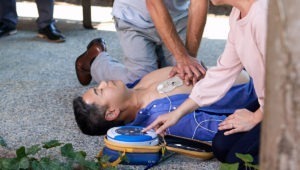Christian Eriksen was saved by the use of a Defibrillator & CPR
Dave | Jun 14 2021 | 2 min read | News
Eriksen‘s Collapse Highlights the Lifesaving Importance of CPR & Defibrillator Training
Danish footballer Christian Eriksen, who is one of the most recognised and talented athletes in world football, collapsed suddenly during a Euro 2020 fixture as a result of cardiac arrest. The highly public nature of this incident has brought with it an increase in exposure and public awareness regarding the life-saving importance of defibrillators & CPR procedure. Having gone into cardiac arrest during Saturday’s game, the 29 year old collapsed suddenly, with the swift treatment administered to Eriksen on the pitch saving his life. According to Morton Boeson, the Danish team doctor, Eriksen’s life was saved through a combination of CPR and the use of a defibrillator, administered on the pitch to Eriksen by paramedics. CPR, or cardiopulmonary resuscitation, is life saving treatment which must be administered to an individual who is suffering from cardiac arrest as soon as possible in order to increase their chances of survival.
The fact that this happened to a professional athlete in peak physical condition, on such a public stage has brought with it widespread attention to cardiac arrest, CPR procedure and how critically important it is to ensure that defibrillators are readily available in public spaces and at sporting events. Since Saturday, countless articles have been published online outlining the urgency with which paramedics responded to Eriksen and how these quick reactions of on-site medical staff and paramedics saved his life. However, the attention brought upon sudden cardiac arrest as a result of Eriksen’s collapse has amplified the public concern related to basic CPR training, the use of defibrillators as well as first aid training in general. In many ways, the traumatic and public nature of Eriksen’s collapse serves as a brutal reminder as to the suddenness with which cardiac arrest can strike.

Ireland has one of the most favorable ‘bystander rates’ for CPR anywhere in the world. In addition, according to an article published by RTÉ, 84% of people who suffered from an out of hospital cardiac arrest in 2019 were assisted by people nearby. In the case of sudden cardiac arrest, aside from calling the emergency services, administering CPR is viewed as the “first line of defense” and should be administered at a rate of between 100 and 120 compressions per minute until the arrival of medical assistance. As seen on Saturday, cardiac arrest can occur at any time, so in order to improve chances of survival for the victim it is imperative to act quickly. Much of the narrative surrounding the weekend’s tragic events have been focused on the need to improve the availability of defibrillators in public spaces and at sporting grounds and arenas, as well as to encourage engagement with first aid courses and CPR courses.
Highly traumatic incidents such as those witnessed on Saturday also show the importance of education and training regarding CPR, using a defibrillator and first aid training. Here at Heartsafety Solutions, our aim is to save lives. In order to do so, we provide essential first aid training courses, covering areas such as CPR and sports first aid. We offer a mixture of both in person and online courses, designed to best suit your specific needs. As well as this, we also supply and sell AED defibrillators & defibrillator storage units across Ireland.
If you have any questions relating to CPR, defibrillators or health and safety training please do not hesitate to get in touch with us today. Our full range of life saving defibrillators is also available to view online through our website.